Brew With Us ESSENTIALS – water treatment products

Salts and vinegars
… well, not really vinegar – there are tastier acids out there!
Let’s explore the wide range of water treatment products you can use.
Acids
AMS
One of most common acids available for homebrewers in the UK is AMS (sometimes called CRS, “Carbonate Reducing Solution”). This is a blend of hydrochloric and sulphuric acid. AMS will increase the level of both chloride and sulphate in your liquor, so for some waters and beer styles you may find this is a one-stop water treatment – sorting your mash pH and sulphate to chloride ratio in one!
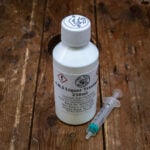
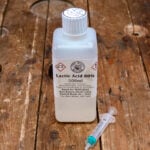
Lactic acid
Lactic acid is the same acid found in yoghurt, sauerkraut, and sourdough bread. Lactic acid will only affect the pH of your liquor and won’t change the levels of sulphate and chloride. This can sometimes be preferable. Larger amounts of lactic acid (more than 0.25ml per litre, i.e. over 5ml in 20 litres) can have a flavour impact, adding the tang familiar from the foods mentioned above. More than 0.5ml per litre (10ml in 20 litres) will definitely be noticeable. This applies to the total liquor including both mash and sparge amounts: e.g. 5ml lactic acid in a 10 litre mash is okay if the sparge is another 10 litres and doesn’t have any acid added to it (total acid = 5ml, total liquor = 20 litres).
Other acids
Phosphoric acid is less widely used in the UK than the USA. Like lactic acid, it won’t affect the balance of sulphates and chlorides in your liquor, but it also has the advantage of being relatively flavour neutral, as it’s very similar to the natural acids produced in fermentation.
You could also choose to use acidulated malt. This has a higher level of natural lactic acid than other malts, and it is often used in German lagers to help adjust the pH without the need to add liquid acids. As with liquid lactic acid, using too much acidulated malt can give a tang, so it’s best to stick to under 5% of the total grist.
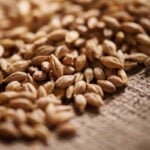
Minerals
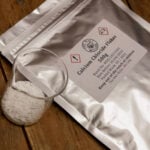
Calcium chloride
This mineral comes as small flakes. It is very sensitive to water and will even start to pull water vapour out of the air (you can see it start to almost “sweat”!), so use any you measure out within half an hour. As the name suggests, using this mineral will increase both your calcium and chloride levels. It will also slightly reduce pH.
Gypsum (calcium sulphate)
Gypsum is a powdery mineral that looks a bit like chalk. Like calcium chloride, it is sensitive to water and will clump up quickly. Gypsum increases both calcium and sulphate levels. It will also slightly reduce pH.
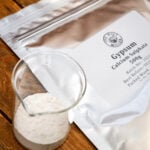
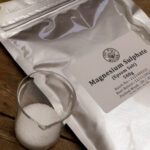
Epsom salts (magnesium sulphate)
This mineral comes in small crystals that look like large grains of table salt. No surprise that it adds both magnesium and sulphates! You would typically use this to increase sulphate levels without adding more calcium.
DWB
“Dry Water Burtonisation” salts are a powdered blend of calcium chloride, gypsum, and Epsom salts. These add lots of calcium, a little magnesium, a good amount of chloride, and lots of sulphates, giving an approximation of the famous Burton water profile used for traditional British ales and bitters. DWB will give you a higher sulphate to chloride ratio (more sulphates means sharper bitterness) so it is less useful when brewing styles that favour more chlorides (e.g. hazy IPA, lagers, stouts). Because it contains both calcium chloride and gypsum, DWB will slightly reduce pH.

Sodium chloride
Better known as table salt, as you might expect this adds both sodium and chloride. A little sodium will increase the perception of body and malt sweetness, but too much risks a savoury, salty flavour.
Chalk (calcium carbonate)
Carbonates are alkaline, and if you’re brewing with hard tap water, adding more alkalinity to your mash is normally the opposite of what you’re trying to achieve! However, for very soft water – such as bottled or RO waters – you might find that you need to raise your mash pH. Chalk will add both alkalinity and calcium to your liquor. It doesn’t readily dissolve in water unless the water is already acidic, so it is best added when you dough in and stirred through thoroughly.
Sodium bicarbonate (baking soda)
Just like chalk, sodium bicarbonate, also known as baking soda or bicarbonate of soda, is used to raise mash pH. Baking soda dissolves much more easily than chalk, which can make it a better choice, but be careful of the overall sodium level of your mash to avoid a salty flavour.
Slaked lime (calcium hydroxide)
Slaked lime, aka pickling lime or caustic lime, is a powdery white mineral that is highly alkaline. If you add it when you dough in, it will add both alkalinity and calcium to your liquor, so you can use it to raise your mash pH.
You can also use small amounts of slaked lime to actually reduce the alkalinity of your brewing liquor as described last time. This needs to be done when you collect your liquor and you must make sure to leave behind the flaky deposits slaked lime leaves behind. These are all the alkalis that have been removed from the water, and if you leave them in they can dissolve back into your liquor and make it very alkaline. Treating your liquor in this way will reduce the level of calcium and alkalinity in your liquor, so you may need to add more calcium back in.
The high alkalinity of slaked lime means it can irritate or burn your skin just like an acid, so take extra care and always wear gloves when using it.
Other water treatment chemicals
There are many other products and additives available, though for the majority of water sources and beer styles the ones listed above will be all you need.
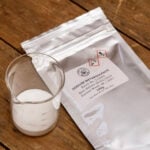
Sodium metabisulphite, also called Campden, is used to remove chlorine and a similar chemical, chloramine, from your water. Even small amounts of chlorine and chloramine can react badly with the flavour compounds in beer, so it’s best to remove it. 0.25g of sodium metabisulphite is enough to treat 25L of water and won’t leave any flavour of its own. The process isn’t instant, so it’s a good idea to collect and treat your brewing liquor at least a few hours before you begin brewing – the night before is ideal.
Another chemical worth mentioning is Brewtan B. This is a concentrated powder that helps remove iron and other metals when added to your raw liquor before you dough in. It also acts as a powerful antioxidant when added at the end of fermentation. Brewtan B needs a bit of work to dissolve so it’s best to stir it into a little water before adding to either your mash tun or your fermenter.
Building a profile
We know what minerals we want, what pH level we’re aiming at, and which products we can use to make adjustments.
Now let’s put it all together to make your perfect liquor…


